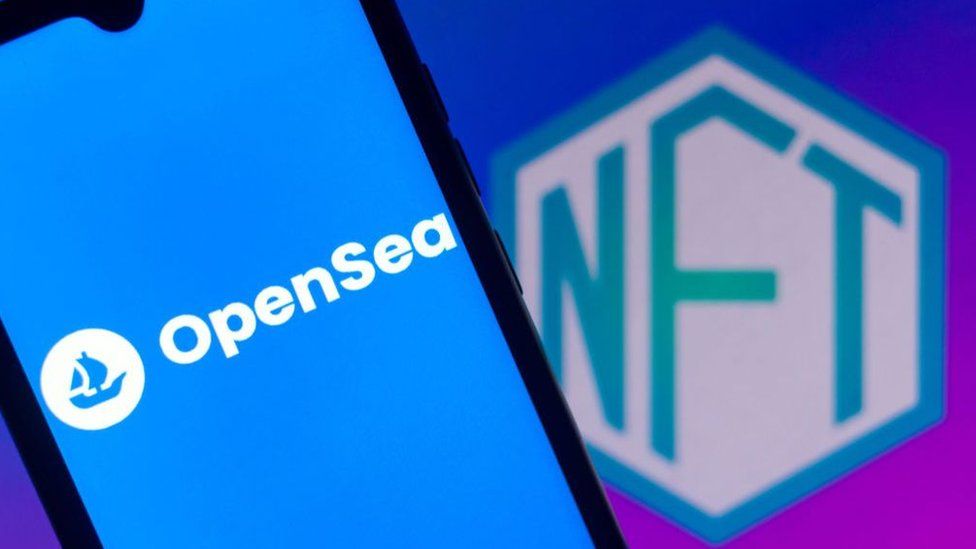
James Carter
Breaking News: OpenSea faces a $500,000 lawsuit over theft

If you believe one account holder on the NFT marketplace, OpenSea is not doing enough to protect its customers and is instead trying to get money from them, even though the company knows it has security and fraud problems.
Kevin Rose, a well-known NFT creator, collector, and venture capitalist would no doubt agree that theft is a big problem in the NFT space. In a recent phishing attack, he lost a piece of his collection worth $1.1 million, but that had nothing to do with OpenSea.
As we explain below, Robert Acres also fell for an NFT phishing attack. Acres is a user of OpenSea, but she is not as well-known as Rose. Two of her NFTs were stolen in a phishing attack.
He says that instead of working quickly to help him get his property back and stop the thieves from selling it again, as OpenSea is said to have done for Rose, the leading NFT marketplace locked him out of his account for three months.
Acres says that because he couldn’t trade the 58 NFTs in his account during that time, he lost a lot of money.
On OpenSea, you can see that the two stolen NFTs that have been blacklisted are listed with a warning that they can’t be bought or sold because of suspicious activity.
The thief sold Acres’s stolen NFTs for between 0.5 and 0.7 WETH.
But Acres thinks he lost as much as $500,000 because he couldn’t trade his remaining NFTs on OpenSea. He is suing the NFT marketplace, OpenSea, which is a trading name for Ozone Networks Inc, to get his money back.
He has hired Traverse Legal, whose team is led by Enrico Schaefer, who is a managing partner and trial lawyer who specializes in blockchain and web3.
A user of OpenSea says that after he complained, his account was locked.
Acres says that OpenSea locked him out of his account after he told them that they were taking too long to respond to the theft.
Crypto news saw timestamped support messages with OpenSea from July 12, 2021, the day the theft happened. These messages show that Acres told OpenSea about the theft before the stolen NFTs were sold on the marketplace.
The email to OpenSea support about the theft says that it was sent at 2:11 PM UTC.
The tx hashes show that it took a half hour from the time OpenSea found out about the theft to the time it was sold on the marketplace.
One could argue that OpenSea didn’t have much time to respond in the half-hour window, but if this were legacy finance, where automated surveillance systems are in place, there would be quick ways to stop suspicious activity.
But since OpenSea didn’t do anything to stop the resale, it might be safe to assume that it didn’t have strong enough systems in place to be able to respond quickly to these kinds of alerts from users.
The first response from OpenSea seems to be a deliberate lie.
In the only public statement OpenSea has made about the matter so far, a spokesperson said, “The theft in question happened outside of OpenSea, and the items were sold before OpenSea found out about the reported theft.” “As soon as we heard about it, we turned off the items, and the user’s account has been unlocked since then.”
Due to what was said in the first part of the first line, the incident in question was a phishing attack that had nothing to do with OpenSea. If what Mr Acres says is true, then the rest of what was said in that portion of the statement is incorrect. As you can see up there, OpenSea had prior knowledge of the theft before the sale went through.
The second phrase is dishonest, to say the least, due to the fact that it gives the impression that the user’s account was unlocked not long after the two NFTs were disabled. Despite this, Acres’ account was disabled for a period of three and a half months.
In fact, it seems that Acres’ account was locked because he was upset that OpenSea didn’t stop the stolen NFTs from being sold.
Acres writes in an email to Cryptonews.com:
“I was angry and thought OS was partly to blame for what had happened, so I wrote down that OS should pay for the damage. OS locked my account without warning, permission, or request.”
Acres then says, “OS demanded that I swear under oath that my wallet had not been stolen, so that OS would not be responsible.”
Acres says that he was locked out of his account because he didn’t agree with what OpenSea supposedly wanted. Acres also says that OpenSea stopped him from trading his 58 NFTs on the OpenSea market because of the lockout.
A user of OpenSea says that the NFT marketplace “can take your NFT assets.”
Acres stated in an email sent to Cryptonews.com, “OS asserts that the NFTs of its users are not in the hands of OpenSea.” The vast majority of OpenSea members are unaware that OS has the ability to confiscate their non-fungible token (NFT) assets and prevent them from being moved or traded for several days, weeks, months, or possibly even permanently, even if they have not broken any rules.
On the OpenSea help page, it’s clear that the opposite is true:
“We can stop OpenSea’s services from being used to buy or sell your items, but they will still be on the blockchain and not in OpenSea’s possession.”
OpenSea wouldn’t be able to stop a user from trading their NFTs on a different market, but it wouldn’t be able to stop them from doing so, either. So, strictly speaking, it may not be true, as Acres says, that OpenSea “can seize your NFTs.”
In practice, though, OpenSea is where most of the liquidity on the NFT market can be found. Here, we can see in a big way how crypto decentralization doesn’t work as well in practice as it does in theory.
Acres stated the following to Crypto news in order to provide support for his contention that OpenSea is to blame for the lock that was placed on his account: “When your wallet is ‘locked’ or ‘blocked,” all the details in it are flagged as suspicious. This means that even if they are moved to another wallet, they won’t be able to trade on OpenSea until they remove the flag against your account.
“At the moment, OpenSea controls more than 60% of all NFT trading, but when this incident happened, that number was much higher.
“Because the left-over trading volume is being split between competitors, you can’t get the best prices, and this again adds to the money I’m losing because of a wallet lock that was put on me against my will.
“Most people who trade on a marketplace that is not OS end up using OS as a resale market after they buy something on a competitor’s marketplace.
“So again, in this case, all of my NFTs would be marked as “suspicious” on the OS marketplace. The new buyer also couldn’t sell it, so when they did their research before buying, they wouldn’t buy them because they wouldn’t be able to sell them.
How likely is that line of thought to work in a court of law?

OpenSea is accused of trying to get money by force.
We asked Enrico Schaefer, the managing partner at Traverse Legal and Acres’s lead lawyer, the same question about whether the complainant was free to trade his NFTs somewhere else.
This is what he said.
“OpenSea stole Mr Acres’ property by taking over his account, which is called a “tort of conversion” in the legal world. This gives people who have been stolen from the legal right to go to court to get their money back.
“In essence, conversion gives someone the right to sue for damages if their property is taken without their permission. Conversion happens when someone takes control of another person’s property or money without their permission and with the intention of making it hard for them to get it back.
“It doesn’t have to be all or nothing with the control. The fact that OpenSea didn’t respond and tried to get money to unlock the account must have surprised and worried you, as it would for anyone in the same situation.
Why didn’t OpenSea act quickly when they heard about the NFT theft?
Traverse Legal, working for Acres, also says that OpenSeas had three hours to do something before the stolen NFTs were sold on its platform.
“If OpenSea hadn’t waited more than three hours to take action, the NFT could have been locked and maybe given back to his wallet,” Traverse Legal writes.
According to an analysis by Cryptonews, there was only a half-hour gap between finding out that the coins were stolen and finding out that they were sold.
Still, after all the well-known problems on the site, like insider trading and theft, OpenSea should have put in place systems and processes, both automated and manual, to stop suspicious activity right away when it is reported.
Even if you ignore the timing, OpenSea should be able to defend itself by saying that Acres could have traded the 58 NFTs he had listed on OpenSea at another place.
“This is something you should talk to Robbie about, since he was there,” Schaefer told Cryptonews in an email.
He went on: “However, I have helped clients with similar problems before.” The claim that a “lesser platform with fewer sellers and buyers” could have been used instead is not a good reason for OpenSea to avoid its responsibilities to its platform members.
“OpenSea is the platform of choice for people who want to increase market demand and price pressure.” If we had used a platform with a much lower number of sales, we would have had a liquidation sale instead of real trading.
Latest
News
03 Feb 2026












